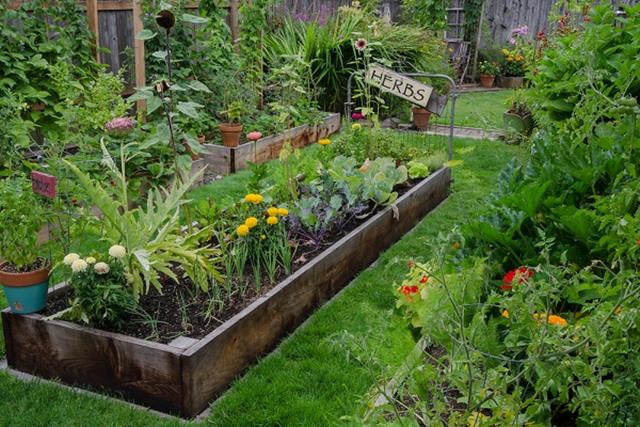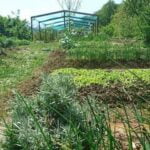The growing trend of home vegetable gardening is becoming increasingly popular, with more and more people realizing the numerous benefits it offers. From improving nutrition and physical activity to saving money on grocery bills, there are plenty of reasons why so many individuals are turning to gardening as a way to enhance their well-being.
In this article, we will explore the various advantages of home vegetable gardening, including its positive impact on health, finances, the environment, emotions, education, and community.
Home vegetable gardening not only provides an opportunity for individuals to grow their own fresh produce but also promotes a healthier lifestyle overall. By incorporating a variety of vegetables into one’s diet that have been grown at home, individuals can enjoy the benefits of consuming organic and nutritious food that is free from harmful chemicals. Additionally, the physical activity involved in tending to a garden contributes to an active lifestyle and overall improved well-being.
In addition to personal health benefits, home vegetable gardening presents economic advantages as well. With the rising cost of food, growing one’s own vegetables can lead to significant savings on grocery bills. Furthermore, by reducing the demand for mass-produced vegetables that often come with a high carbon footprint due to transportation and storage processes, home vegetable gardening also has favorable environmental impacts.
Health Benefits of Home Vegetable Gardening
Home vegetable gardening not only provides a sustainable source of fresh produce but also offers numerous health benefits. By growing your own vegetables, you can have access to nutrient-rich, organic foods that are free from pesticides and harmful chemicals commonly found in store-bought produce.
This promotes a healthier diet and improved nutrition for you and your family. Additionally, the physical activity involved in gardening, such as planting, watering, weeding, and harvesting, helps to increase daily exercise levels, promoting overall physical well-being.
Some of the Key Health Benefits of Home Vegetable Gardening Include
- Increased consumption of fresh, nutritious vegetables
- Elimination of harmful chemicals and pesticides from your diet
- Promotion of physical activity and exercise through gardening tasks
- Enhancement of overall health and well-being
Moreover, by incorporating a variety of vegetables into your garden, you can enjoy a diverse range of nutrients essential for maintaining good health. Vegetables such as tomatoes, spinach, carrots, and bell peppers are packed with vitamins, minerals, and antioxidants that are beneficial for the body. Consuming these homegrown vegetables regularly can contribute to a stronger immune system and reduce the risk of chronic diseases such as heart disease and diabetes.
In addition to improving nutrition and promoting physical activity, home vegetable gardening can also be an excellent stress-reliever. The act of tending to plants and watching them grow can have a calming effect on the mind, reducing stress levels and contributing to mental well-being. This emotional benefit further enhances the holistic advantages of home vegetable gardening beyond just the nutritional aspect.
Economic Benefits
Many people are starting to realize the benefits of home vegetable gardening, and one of the most compelling advantages is the significant impact it can have on saving money. With the rising costs of groceries, growing your own vegetables at home can help cut down on your grocery bills and provide fresh produce at a fraction of the cost.
By investing time and effort into gardening, individuals can reduce their monthly expenses while enjoying a bountiful harvest throughout the growing season.
Home vegetable gardening also provides an opportunity for individuals to take control of their food supply, reducing their reliance on store-bought produce that can be expensive and sometimes of questionable quality. By planting and nurturing their own vegetables, gardeners have the satisfaction of knowing exactly where their food comes from and can ensure that it is grown in a safe and sustainable manner. This translates to tangible savings at the grocery store while promoting healthier eating habits.
Furthermore, saving money through home vegetable gardening goes beyond just the immediate impact on grocery bills. It also allows individuals to adopt a more self-sufficient lifestyle, which can lead to long-term financial benefits.
By producing a portion of their food at home, gardeners are better equipped to weather economic uncertainties and fluctuating food prices, making them more resilient in times of hardship. Overall, the economic benefits of home vegetable gardening extend far beyond mere cost savings and contribute to a more secure and sustainable way of living.
Environmental Benefits
Home vegetable gardening not only provides a plethora of fresh produce for individuals and families, but it also offers significant environmental benefits. By growing your own fruits and vegetables at home, you are actively reducing your carbon footprint and food miles. This section will delve into the various ways in which home vegetable gardening positively impacts the environment.
Reducing Carbon Footprint
One of the primary environmental benefits of home vegetable gardening is the reduction of carbon footprint. By growing your own produce, you are eliminating the need for transportation to deliver fruits and vegetables from farms to grocery stores. This means less fuel consumption and fewer carbon emissions, ultimately contributing to a cleaner and healthier environment.
Decreasing Food Miles
Another environmental advantage of home vegetable gardening is the decrease in food miles. Food miles refer to the distance that food travels from farm to table. By growing your own fruits and vegetables in a backyard or community garden, you are significantly reducing the distance that your produce needs to travel, thereby minimizing the associated fuel usage and greenhouse gas emissions.
Promoting Biodiversity
Additionally, home gardeners often have the opportunity to grow heirloom or non-traditional varieties of produce that may not be available in commercial farming operations. By cultivating a diverse range of plant species at home, individuals can contribute to promoting biodiversity within their local ecosystem, supporting the resilience of plant species and creating healthier ecosystems overall.
By embracing home vegetable gardening practices, individuals can actively contribute to building a more sustainable future for our planet while enjoying an abundance of fresh, organic produce right from their own backyard.
Emotional Benefits
Home vegetable gardening offers a multitude of benefits, including significant contributions to emotional well-being and stress reduction. Cultivating a garden provides individuals with the opportunity to connect with nature, engage in physical activity, and experience the satisfaction of nurturing plants from seed to harvest.
The act of tending to a garden can be therapeutic, serving as a form of meditation and promoting relaxation. Engaging in gardening activities has been linked to decreased levels of cortisol, the stress hormone, leading to improved mental health.
In addition to stress reduction, home vegetable gardening can also boost mental well-being by providing a sense of purpose and accomplishment. Taking care of plants and witnessing their growth over time can instill a sense of pride and fulfillment in individuals.
The process of gardening encourages mindfulness and presence in the moment, allowing individuals to focus on the task at hand and temporarily escape from daily stressors. Moreover, gardens often become spaces for reflection, offering individuals a peaceful environment for thought and contemplation.
According to recent studies, spending time in green spaces such as gardens has been associated with lower levels of anxiety and depression. Home vegetable gardening not only provides an opportunity for individuals to unwind and disconnect from technology but also contributes to creating a more positive outlook on life. By promoting emotional well-being through stress reduction, mental clarity, and a renewed sense of purpose, home vegetable gardening serves as an invaluable activity for overall holistic health.
| Emotional Benefits | Stress Reduction |
|---|---|
| Therapeutic activity | Decreased levels of cortisol |
| Sense of accomplishment | Mental well-being |
| Mindfulness and presence | Mental clarity |
Educational Benefits
Home vegetable gardening not only provides an opportunity for families to grow their own fresh produce, but it also offers numerous educational benefits for children. Teaching children about nutrition and agriculture through gardening can instill a lasting appreciation for healthy eating and sustainable food practices.
Hands-on Learning
One of the primary educational benefits of home vegetable gardening is the hands-on learning experience it provides for children. By actively participating in planting, tending to, and harvesting their own crops, children gain a greater understanding of where food comes from and the effort required to produce it. This firsthand experience can be a powerful teaching tool that fosters a deeper connection to the food they eat.
Healthy Eating Habits
Through involvement in vegetable gardening, children can learn about the nutritional value of different fruits and vegetables. They can witness the entire growth process, from seed to harvest, and understand the importance of consuming a variety of fresh, whole foods. This knowledge can lead to improved dietary choices and instill lifelong healthy eating habits.
Environmental Awareness
In addition to learning about nutrition, home vegetable gardening offers an opportunity for children to develop environmental awareness. They can discover the impact of sustainable farming practices, such as composting and minimizing chemical use, on soil health and ecosystem balance. Understanding these concepts at a young age encourages a sense of responsibility towards the environment and promotes eco-friendly habits.
Overall, incorporating home vegetable gardening into family activities not only provides access to fresh produce but also serves as an invaluable educational tool for teaching children about nutrition and agriculture. The hands-on learning experience fosters healthy eating habits, environmental awareness, and an appreciation for sustainable food practices that can benefit children throughout their lives.
Community Benefits
One of the most rewarding aspects of home vegetable gardening is the ability to share the fruits (or should we say vegetables?) of your labor with others in your community. Whether it’s swapping excess produce with neighbors or donating to local food banks, there are numerous benefits to sharing your homegrown veggies.
Here are some ways that community benefits from home vegetable gardening:
- Building relationships: Sharing produce with neighbors can help foster a sense of community and build relationships with those around you. It creates opportunities for conversation and connection, and can even lead to friendships and support networks.
- Food security: Donating fresh, locally-grown produce to food banks can contribute to improving food security within your community. Many food banks struggle to provide fresh and nutritious options, so your contributions can make a significant impact on those in need.
- Promoting sustainability: By growing your own vegetables at home, you’re reducing reliance on commercially grown produce which often requires long-distance transportation. This helps minimize the carbon footprint associated with food miles and contributes to a more sustainable food system.
Sharing produce from your home vegetable garden not only benefits those around you, but it also brings a sense of fulfillment knowing that you’re making a positive difference in your community. It’s an opportunity to come together over something as simple as fresh, flavorful produce.
Practical Tips for Starting a Home Vegetable Garden
Home vegetable gardening has become a popular trend among many individuals and families. Not only does it provide a sense of satisfaction and fulfillment, but it also offers numerous benefits. One of the most crucial aspects of home vegetable gardening is planning and preparing for your garden. This includes selecting the right location, ensuring proper soil quality, and choosing the best plants to grow.
When selecting a location for your home vegetable garden, it is important to consider the amount of sunlight the area receives. Most vegetables thrive in full sunlight, so choose a spot in your yard that gets at least 6-8 hours of direct sunlight each day. Additionally, ensure that the location has access to water for irrigation and is protected from strong winds. A good location will contribute significantly to the success and productivity of your garden.
The quality of the soil is another essential factor that can greatly impact the outcome of your home vegetable garden. Before planting, test the soil to determine its pH level and nutrient content. You may need to amend the soil with organic matter or fertilizer to create an environment suitable for growing healthy vegetables.
Consider starting with raised beds or containers if your soil quality is poor in your selected location. Lastly, carefully select which vegetables you want to plant based on their compatibility with your specific soil type and climate.
By carefully considering these practical tips for starting a home vegetable garden-location selection, soil preparation, and plant selection-gardening enthusiasts can set themselves up for a successful harvest while reaping all the wonderful benefits of home vegetable gardening.
Conclusion
In conclusion, home vegetable gardening offers a multitude of benefits that extend beyond just the satisfaction of growing your own food. From improving nutrition and physical activity to saving money on grocery bills, reducing your carbon footprint, and providing stress relief, the benefits of home vegetable gardening are numerous and far-reaching. Not only does it provide a source of fresh, healthy produce, but it also serves as a valuable educational tool for teaching children about nutrition and agriculture.
Furthermore, engaging in home vegetable gardening provides an opportunity to connect with the community by sharing surplus produce with neighbors and local food banks, fostering a sense of camaraderie and goodwill. As more people embrace the rewards of home vegetable gardening, they also contribute to environmental sustainability by minimizing food miles and reducing reliance on mass-produced, commercial crops.
The act of growing one’s own food allows individuals to take control of their diet and make more informed choices about what they put into their bodies.
Overall, the practice of home vegetable gardening offers both physical and mental health benefits while also creating a greater sense of connectedness with nature and the community. By starting a garden at home, individuals not only stand to gain the practical advantages but also find themselves partaking in a fulfilling and rewarding hobby that enriches both their lives and the environment.
Through embracing the rewards of home vegetable gardening, individuals can take charge of their well-being while contributing positively to society as a whole.
Frequently Asked Questions
What Are 3 Benefits of Gardening at Home?
Gardening at home has numerous benefits. Firstly, it promotes physical activity and outdoor time, which are essential for overall health. Secondly, it allows people to grow their own organic produce, leading to a healthier diet. Lastly, gardening can reduce stress and promote mental well-being.
What Are the Benefits of Growing a Vegetable Garden?
Growing a vegetable garden offers various benefits, such as access to fresh and nutritious produce right from your backyard. It also reduces grocery expenses and limits exposure to pesticides found in store-bought produce. Additionally, vegetable gardening promotes sustainability and self-sufficiency.
Why Is It Good to Grow Your Own Vegetables?
Growing your own vegetables is beneficial for several reasons. Firstly, it ensures that you have easy access to fresh, pesticide-free produce that can contribute to a healthier diet.
Secondly, it allows for greater control over the growing process and the ability to choose sustainable practices. Lastly, growing your own vegetables can be a therapeutic and rewarding experience that fosters a deeper connection with nature.

If you’re looking to get into vegetable gardening, or are just looking for some tips on how to make your current garden better, then you’ve come to the right place! My name is Ethel and I have been gardening for years. In this blog, I’m going to share with you some of my best tips on how to create a successful vegetable garden.





